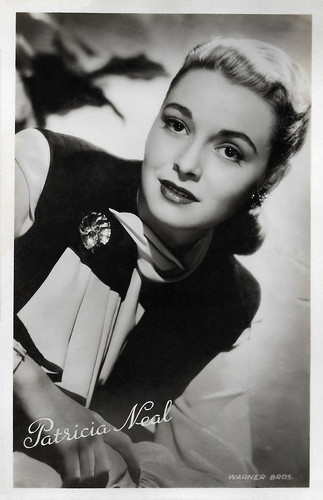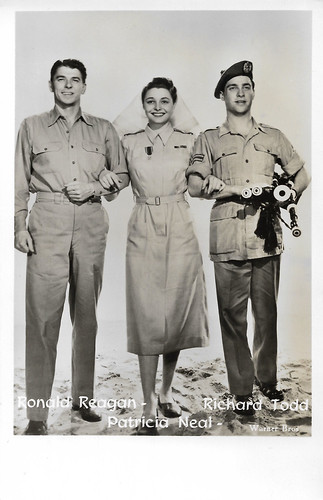
Dutch postcard, no. 3047. Photo: Warner Bros.

Vintage postcard. Photo: Warner Bros.

Vintage postcard, no. 86. Photo: Warner Bros.
A hell of a compliment
Patricia Neal was born Patsy Louise Neal in Packard, Kentucky, in 1926. Her father, William Burdette Neal, managed a coal mine and her mother, Eura Mildred Petrey, was the daughter of the town doctor. Patsy grew up, with her two siblings, Pete and Margaret Ann, in Knoxville, Tennessee, where she attended high school.
She was first bit by the acting bug at the age of 10, after attending an evening of monologues at a Methodist church. She subsequently wrote a letter to Santa Claus, telling him, "What I want for Christmas is to study dramatics". She won the Tennessee State Award for dramatic reading while she was in high school. She apprenticed at the Barter Theater in Abingdon, Virginia, when she was 16 years old, between her junior and senior years in high school. After studying drama for two years at Northwestern University, she headed to New York City.
Her first job was as an understudy in the Broadway production of the John Van Druten play 'The Voice of the Turtle' (1947). It was the producer of the play that had her change her name from Patsy Louise to Patricia. After replacing Vivian Vance in the touring company of 'Turtle', she won a role in a play that closed in Boston and then appeared in summer stock.
She won the role of the teenage Regina in Lillian Hellman's play, 'Another Part of the Forest' (1946), a prequel to 'The Little Foxes', for which she won a Tony Award in 1947. According to IMDb, she was visited backstage by Tallulah Bankhead - who had played the middle-aged Regina in the original Broadway production of Hellman's 'The Little Foxes' - and told Neal, "Dahling, you were as good as I was - and if I said you were half as good, it would [still] have been a hell of a compliment!"
The role made the 20-year-old Neal a star. Subsequently, Neal signed a seven-year contract with Warner Bros. In the first part of her film career, her most impressive roles were in The Fountainhead (King Vidor, 1949), opposite the much older Gary Cooper, with whom she had a three-year-long love affair, and in director Robert Wise's Sci-Fi classic, The Day the Earth Stood Still (1951), which she made at 20th Century-Fox. Her affair with the married Cooper led to an abortion and a nervous collapse. It quickened her decision to leave Hollywood.

Spanish postcard, no. 348. Photo: Warner Bros. Patricia Neal and Gary Cooper in The Fountainhead (King Vidor, 1949). Collection: Marlene Pilaete.

Belgian postcard by Nieuwe Merksemsche Chocolaterie S.P.R.L., Merksem (Anvers), No. D 13. Photo: Warner Bros. Ronald Reagan, Patricia Neal and Richard Todd in The Hasty Heart (Vincent Sherman, 1949).
Suffering a series of strokes
Patricia Neal returned to Broadway and achieved the success that eluded her in films, appearing in the revival of Lillian Hellman's play, 'The Children's Hour', in 1952. She met writer Roald Dahl in 1953 at a formal party, and they were married nine months later. The couple would have five children in 30 years of marriage.
In 1957, Patricia Neal had one of her finest roles in Elia Kazan's parable about the threat of mass-media demagoguery and home-grown fascism in A Face in the Crowd (1957). Before she appeared in the film, Neal had taken over the role of Maggie in Tennessee Williams' 'Cat on a Hot Tin Roof', the Broadway smash that had been directed by Kazan. Returning to the stage, she appeared in the London production of Williams' 'Suddenly, Last Summer' and co-starred with Anne Bancroft in the Broadway production of 'The Miracle Worker'.
After appearing opposite Audrey Hepburn and George Peppard in Breakfast at Tiffany's (Blake Edwards, 1961), she had what was arguably her finest role, as Alma the housekeeper, in Hud (Martin Ritt, 1963) opposite Paul Newman. The film was a hit and Neal won the Best Actress Oscar. She co-starred with John Wayne and Kirk Douglas in the war film In Harm's Way (Otto Preminger, 1965).
In 1965, she suffered a series of strokes. Variety, the entertainment newspaper, mistakenly reported in their 22 February 1965 headline that Patricia Neal had died from her multiple strokes five days earlier. In truth, she remained in a coma for 21 days. She was filming John Ford's film, 7 Women (1965), and had to be replaced by Anne Bancroft. Neal was pregnant at the time. She underwent a seven-hour operation on her brain and survived, later delivering her fifth child. Her daughter, Lucy Dahl, was born healthy, but in its aftermath, the actress suffered from partial paralysis and partial blindness, she lost her memory and was unable to speak.
She underwent rehabilitation supervised by her husband. He designed her strenuous and intense recovery routines, including swimming, walking, memory games and crossword puzzles. Her experiences led to her becoming a champion in the rehabilitation field. She turned down The Graduate (Mike Nichols, 1967) as she had not recovered fully from her stroke. When she returned to the screen, in The Subject Was Roses (Ulu Grosbard, 1968), she suffered from memory problems. According to her director, Ulu Grosbard, "The memory element was the uncertain one. But when we started to shoot, she hit her top level. She really rises to the challenge. She has great range, even more now than before". She received an Oscar nomination for her work. Subsequently, new acting roles equal to her talent were sparse.

Vintage card. Photo: Warner Bros.

British postcard in the Picturegoer Series, London, no. W 658. Photo: Warner.
Neal and Dahl's ordeal and ultimate victory over her illness
Patricia Neal received three Emmy nominations, the first for originating the role of Olivia Walton in the TV movie The Homecoming: A Christmas Story (Fielder Cook, 1971), which gave birth to the TV show The Waltons (1972). One of her last films was the comedy Cookie's Fortune (Robert Altman, 1999) with Glenn Close and Julianne Moore.
Patricia Neal died in 2010 in Edgarton, Massachusetts from lung cancer. She was 84 years old. She had become a Catholic four months before she died and was buried in the Abbey of Regina Laudis in Bethlehem, Connecticut, where the actress Dolores Hart, her friend since the early 1960s, had become a nun and ultimately prioress.
Neal and Dahl's ordeal and ultimate victory over her illness were told in the television film The Patricia Neal Story (Anthony Harvey, Anthony Page, 1981), starring Glenda Jackson and Dirk Bogarde.
After he played such a strong and devoted role in her physical and mental recovery from her paralytic illness, Neal divorced her husband, Roald Dahl, in 1983 after discovering his long-term affair with her former close friend, Felicity 'Liccy' Crosland. Dahl and Crosland married shortly after his divorce from Neal became final, and remained wed until Dahl's death.
Neal and Dahl had five children: Ophelia Dahl, Lucy Dahl, Theo Dahl, Tessa Dahl, and Olivia Twenty Dahl (1955-1962), who died suddenly from complications of measles encephalitis at the age of seven. The story of Olivia's death and how Neal and Dahl coped with the tragedy was dramatised as a made-for-TV movie, To Olivia (John Hay, 2020). Neal and Dahl had numerous grandchildren. Patricia Neal always refused to reveal the name of her second husband, the man she married after her divorce from Roahl Dahl.

Vintage postcard. Photo: Warner Bros.

Vintage postcard.

Italian postcard by B.F.F. Edit (Casa Editr. Ballerini & Fratini, Firenze), no. 2651. Photo: Metro-Goldwyn-Mayer.
Sources: Jon C. Hopwood (IMDb), Wikipedia (Dutch and English) and IMDb.
No comments:
Post a Comment